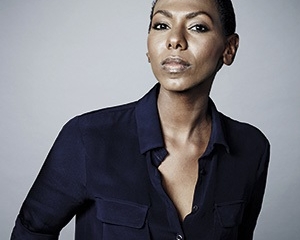Nima Elbagir

Elbagir is the 2018 ICFJ Excellence in International Reporting Award winner. She joined CNN in February 2011 as a Johannesburg-based correspondent before moving to the network's Nairobi bureau and later London. A recipient of the Royal Television Society's (RTS) 2016 Specialist Journalist of the Year Award, Elbagir has focused much of her reporting on Africa.
In the fall of 2017, Elbagir traveled to Libya with producer Raja Razek and photojournalist Alex Platt to investigate reports of African migrants being sold at slave auctions. Carrying concealed cameras into a property outside the capital of Tripoli, Elbagir and Razek witnessed a dozen African migrants auctioned off -- some for as little as $400 -- in less than 10 minutes. Their shocking report, which sparked a global outcry, was recognized with a George Polk Award in the Foreign Television Reporting category as well as the RTS Award for Scoop of the Year this year.
At immense personal risk, Elbagir reported on the Ebola outbreak that ravaged West Africa in 2014, going inside Liberia's quarantine zones and exploring the devastation the disease has wrought across both urban and rural communities. She was also the first international journalist to report from Chibok, the northern Nigerian village from which over 250 schoolgirls were kidnapped by the terrorist group Boko Haram in 2014. Here she was able to interview two young girls who had managed to escape, and who described the ordeal of the capture and the fear they now felt. Nearly two years after their abduction, Elbagir and producer Stephanie Busari obtained a 'proof of life' video for some of the kidnapped girls.
Elbagir also filed several exclusive reports on the story of Yehya Ibrahim, a Sudanese woman sentenced to death for committing apostasy -- interviewing Ibrahim's estranged family and her terrified husband. Her work on this story brought the attention of the world to Ibrahim's plight, helping to generate the political pressure which eventually led the Sudanese government to grant her a reprieve.
She also led CNN's coverage on the spiraling violence which engulfed the Central African Republic, traveling with the French troops as they worked to broker peace between entrenched Muslim and Christian fighters.
She reported from Somalia at the height of the Horn of Africa famine, and was granted an exclusive phone interview with Safia Gadhafi, the former Libyan leader's wife, in Tripoli. Following the revolution in Egypt, Elbagir interviewed the Justice Minister Mohamed Abdelaziz al-Juindy, who called for former Egyptian President Hosni Mubarak to face the death penalty. She also reported from South Sudan as the new African country celebrated independence.
As a freelancer for CNN, she covered the escalating violence against women in the Congo; Nigeria's 50th anniversary of independence; the South Sudanese Referendum; and CNN's coverage of the Hajj.
Before joining CNN, Sudanese-born Elbagir worked in various capacities for the UK's Channel 4 for a number of years starting in 2005: She freelanced from Kabul for Channel 4 News; reported for the "Unreported World" documentary strand; and both reported and presented for Channel 4 News and More4 News.
During this period, Elbagir's exclusives included getting the first interview with the Aegis security company whistleblower on the Iraq "Trophy Videos" (2005); interviewing Jacob Zuma in the run-up to his rape trial (2006); being the only Western journalist reporting from Mogadishu during the U.S. bombing of Somalia (2007); and broadcasting the first televised evidence of Iranian weaponry smuggled to the Taliban (2009).
Elbagir began her journalism career as a stringer with Reuters in 2002 reporting from Sudan, and one of the first to provide footage from inside Darfur; while also filing material for the Economist, the FT and Radio France International. She stayed on with Reuters as a London-based Graduate Trainee through to 2005.

